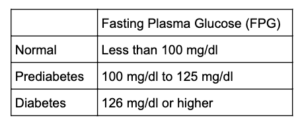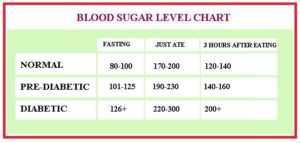Contents
What Is Fasting Blood Sugar?
As the name suggests, fasting blood sugar is the amount of sugar present in your blood after fasting (typically after 8 hours). During these fasting hours, you cannot eat or drink anything except water.
The normal range of fasting blood sugar levels varies from 70-100mg/dl. If your blood sugar level is more than this then you may have diabetes.
Fasting sugar is preferred by doctors as it is a reliable number compared to non-fasting sugar levels. After eating different types of food, our blood sugar level fluctuates differently. So, doctors, may not get a correct picture of your blood sugar level.
Your doctor may also ask for fasting sugar levels to calculate your insulin resistance.

How Does Fasting Blood Sugar Test Work?
When we don’t eat anything for as long as 8 hours, the sugar level in our body goes down. Then our liver secrets some stored glucose in our blood vessels which will move into body cells with the help of insulin.
So, in a fasting blood sugar test if your blood sugar level is more than normal that means your body lacks insulin and you may have diabetes.
When Should You Take This Test?
Fasting blood sugar is usually performed to diagnose diabetes. You should take this test when you are experiencing any diabetes symptoms – such as frequent urination, feeling thirsty, constant tiredness, and sudden weight loss.
You may also take this test to check if you have pre-diabetes.

Risks of Abnormal Fasting Blood Sugar Levels
As suggested earlier, the normal fasting blood sugar level is between 70-100mg/dl.
- If your blood sugar level is below 70mg/dl then you may have hypoglycemia or low blood sugar.
- A blood sugar level of 100 suggests prediabetes or borderline diabetes.
- A blood sugar of 120 mg/dl is an indication of diabetes.
How To Keep Your Blood Sugar Level Normal?
Keeping your blood sugar level normal is possible. You can manage your blood sugar naturally if You just make some lifestyle changes like:

Take The Right Diet
Eating nutritious food can benefit in keeping your blood sugar level normal. You can include green vegetables and low glycaemic fruits in your daily diet to manage your blood sugar. If you have hyperglycemia (High blood Sugar) you should avoid juices, and eat whole fruits. Ensure you get all the vitamins and minerals through your diet. Keep your calorie count and look out for what does not suit you, as different foods have a different impact on everybody. If you face any problem regarding your diet, consult a good dietician or diabetologist.
Eat High Fibre Foods
As mentioned above, you should eat low-sugar and high fibre food. Fibres are a good replacement for carbohydrates, as fibres help in lowering blood sugar. Prefer whole grain cereals and high fibre foods. You should also take protein and fat-containing foods. If you are a non-vegetarian, go for animal protein, and if you are a vegetarian, you can always opt for pulses.

Drink A Lot of Water
Raised blood sugar needs a way to get out of the body. So, your body starts releasing blood sugar in the urine. Therefore, provide enough water to your body. Drinking a lot of water may help in urinating frequently, which will help your body to get rid of the extra sugar.
Reduce Stress
When you have high blood sugar, it affects your body organ. To maintain the health of your overall being, choose some ways to reduce stress. It will not only help in maintaining blood sugar levels but also will be beneficial for your overall health. You can meditate or do some playful activity to keep your brain and body healthy.
Take Proper Sleep
Sleep for 7-8 hours to provide the proper rest to your body. You may feel tired or weak if your blood sugar level is more than normal. Taking a good sleep is important for people with high blood sugar as it will reduce stress, make you feel good which is important for bringing your blood sugar level to normal.
Regular Exercise
Studies say exercising regularly helps in maintaining your blood sugar levels. You can choose yoga, aerobics, or any exercise that you like. Do it for 30 minutes on a daily basis. Staying physically active, even a walk after the meal would help in maintaining your blood sugar level. Exercising will also help in maintaining a healthy weight and that helps in managing blood sugar levels.
Quit smoking
Smoking increases the risk of many health problems. If you have a high blood sugar level, it may increase the risk of health complications like eye diseases, heart problems, nerve damage, etc. you should avoid smoking at all costs.
Avoid Alcohol
You should avoid alcohol as much as possible, even if you drink it, take it in a moderate amount. As alcohol may increase your blood sugar level.
Making these changes in your daily routine will not only help you in maintaining your blood sugar but also keeps your overall health good as well. Do not forget to check your blood sugar regularly, and in case of any discomfort or problem consult a doctor.
A Word From MantraCare
Do you want to get rid of diabetes? Join our online diabetes consultation program and reverse your Diabetes naturally through lifestyle changes such as a Personalized Diet plan, Exercise, dieticians, and health coaches.


